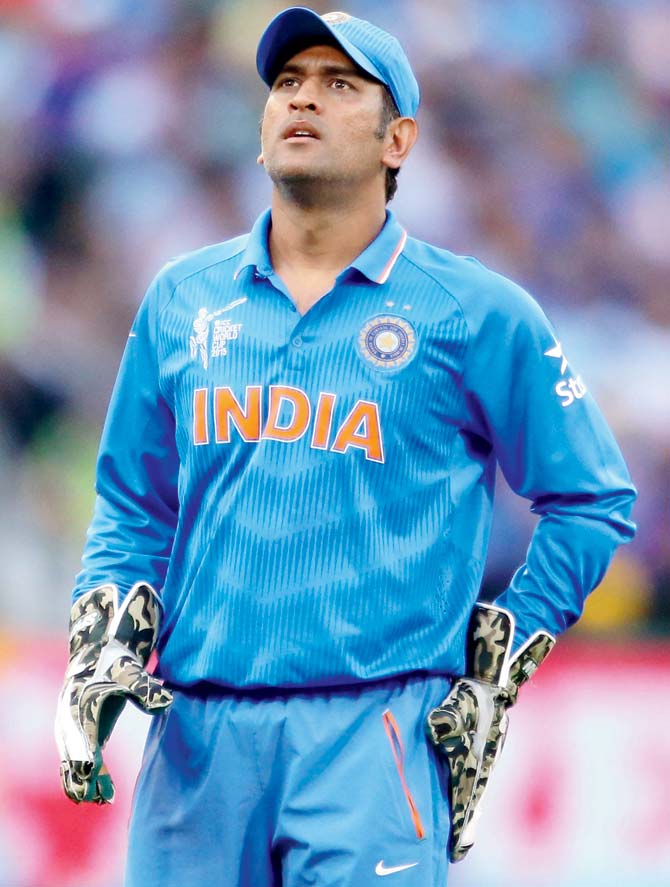Over-staying your time as captain can have the same debilitating effect on a team, as appointing the wrong player for the job in the first place, writes Ian Chappell

MS Dhoni
 When Alastair Cook lost the Ashes series five-nil in Australia his future as England captain seemed about as limited as a T20 bowling spell.
When Alastair Cook lost the Ashes series five-nil in Australia his future as England captain seemed about as limited as a T20 bowling spell.
Not only has Cook survived but he's prospered to the point where he regained the Ashes from those pesky Australians and also rubbed the South Africans' noses into their beloved Wanderers turf. It's been an amazing feat of resilience, perseverance and a strength of mind that was always evident in his batting. He's also shown that a captain who has his team behind him and all pulling in the same direction, has a great chance of achieving success.
ADVERTISEMENT

MS Dhoni. Pic/Getty Images
Cooperation needed
A good captain can make sensible tactical decisions but if the team isn't fully engaged they won't count for much. Conversely, an ordinary skipper can invoke seemingly dubious strategies but if the team is 100% behind the leader then they'll often succeed.
This doesn't mean captaincy is a popularity contest and the skipper should go out of his way to please everyone
but it does show that a successful leader will have earned the respect of his teammates.
Cook embodies this philosophy; he's not the greatest strategist and he's conservative in his methods but by virtue of hard work and honesty he's earned the respect of a team that wants to play for him.
Not surprisingly his confidence as a captain has grown with the recent spate of successes and despite a poor showing (for him) with the bat, he's enjoying success as a leader.
This is not an uncommon trait in a captain. Greg Chappell's best period of Australian captaincy was his least productive as a batsman. Greg was a perfectionist as a batsman and at times it appeared he couldn't grasp that players were trying their heart out but still failing.
When he suffered a lean trot with the bat it seemed to help him better understand that failure wasn't necessarily a product of not giving 100% effort.
Mark Taylor was a similar case. He went through a bad trot with the bat for a prolonged period but never once did it affect his captaincy. Both Chappell and Taylor were successful captains but when they weren't making runs they ensured it didn't adversely affect their leadership and that they still contributed to the team performance.
Cook is different in that for quite a while he struggled with captaincy and seemed to lack some inherent qualities that a leader must possess to succeed. To his credit he's overcome some of those failings and improved in other areas and he's now a successful international captain.
When they hand out gongs for perseverance and being strong willed, Cook will be near the top of the class both as a batsman and captain.
One tendency a successful captain has to guard against is outstaying his welcome. Captains have a use-by-date, whereby their influence over the team performance either wanes to the point of being negligible or else hampers the side.
MS Dhoni reached the latter stage some time back. The current Indian side is badly in need of new ideas and different stimulation; when the opposition has racked up nearly thirteen hundred runs in four ODI innings it's not all down to flat pitches and wayward bowling.
Little inspiration
Apart from a short period at Manuka Oval where he encouraged Ravindra Jadeja to taunt Mitchell Marsh, Dhoni has provided precious little inspiration to his bowlers. Sure, they have been inconsistent but the bowlers also aren't inspired by field placings that are primarily employed to contain, in the hope that the batsmen will self-destruct.
It's not as if India doesn't have an alternative to captain the side. Virat Kohli has shown himself to be an aggressive leader and he's also in excellent batting form.
When Dhoni started out in the job he was a shrewd captain in all forms of the game and experienced widespread success. However, over-staying your time as captain can have the same debilitating effect on a team, as appointing the wrong player for the job in the first place.
 Subscribe today by clicking the link and stay updated with the latest news!" Click here!
Subscribe today by clicking the link and stay updated with the latest news!" Click here!






